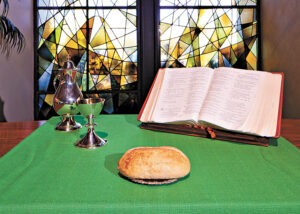When Terry and Monique Mierau moved to rural Manitoba in 2011 with their three young children, they had, for the most part, stopped singing. The former opera singers, professionally trained and with no shortage of singing engagements in Europe, wanted to give heart, soul and even their voices over to farming—although they do add their voices in congregational song at Altona Mennonite Church, where they now attend.
The couple met as students in 1999 at the International Opera Studio in Amsterdam. Terry grew up in Langham, Sask., and studied music at Canadian Mennonite Bible College in Winnipeg and McGill University in Montreal. Monique grew up in Holland, where she studied music before they met in their final year of study that would launch them into their professional careers.
Professional work meant that they would be away on a production anywhere from six weeks to three months several times each year.
“It was a stressful life because it all depends on your voice and what other people think,” says Monique from their home in Neubergthal in southern Manitoba. “After a couple of years, the stresses of the job got to us.”
The romance of staying in different hotels, eating in different restaurants, and staying in different cities began to wear off.
“Our life in singing was very public,” says Monique. “We were always working with large groups of people and standing in front of huge audiences. We needed a place away from cities and away from that whole lifestyle where we could just be.”
They found that place one summer while visiting Terry’s parents in New Brunswick. About 10 years ago they bought an abandoned farm of nearly 40 hectares. During their time there, they began attending Petitcodiac Mennonite Church, which became a significant community in their lives.
“We had absolutely no intention of farming, even of growing a garden,” says Monique. “We bought it as a place we could be when we were not singing, usually two or three months in total at various points throughout the year.”
Monique grew up in a place where food was always fresh, local and of good quality. Eating on the road and the processed food from Canadian supermarkets began to erode her health.
“Waking up in that farm house and seeing all that land, it became very obvious what had to happen,” says Monique.
The couple began to accept singing engagements that worked around their gardening schedule. Then they added a few laying hens and a rooster, that soon multiplied into more than a dozen meat birds, and a couple of pigs.
“We were still traveling and singing,” says Terry. “Usually we came home in May. Sometimes we did short festival deals in summer that took us away, but it started to get harder as the farm kept pulling us home. I remember specifically turning down a contract because I realized if I signed that contract I wouldn’t be able to have pigs the next summer. Economically, it made no sense. It would’ve made more sense to take the money and buy the meat.”
After their first child, Isabelle, was born, “we dragged her around Europe for a year- and-a-half,” he says. “Wherever we went, Monique’s mother would come with us. It worked fine, but what if we were to have more children?”
It was finally the Jersey cow that tethered Terry to the farm.
“That was exactly what we needed at that time and place,” he says. “After all those years of trains, planes, hotel rooms and rented apartments, and travelling, we really needed something you can’t leave, so in 2006 I stopped signing contracts,” he says. “Now this place would have to give us a living.”
Although Monique continued to accept engagements, when it was time to return to her singing career after the birth of their second child, Pieter, she could no longer bring herself to leave the farm.
At this point, they were working harder than ever.
“It was really blood, sweat and tears, and we made so many mistakes, which meant we had to work even harder, but those are the lessons you remember,” says Terry.
The farm became more than a retreat and a way of avoiding overly processed food. It also became a way of addressing issues concerning the quality of food, the way animals are raised, and the way food is grown. They read and discovered that half of the food that is grown goes to waste, and that land and water resources and health are being compromised in the production of so much processed and wasted food.
What they learned led them to raise their voices and model alternatives. Their Christian faith is in everything the couple does, says Monique.
Adds Terry, “What does God require of you, but to seek justice? Once you know of injustice, you don’t have a choice any more.”
A year-and-a-half ago, following Terry’s parents who had moved back out west, they and their animals travelled halfway across the country to Neubergthal, where they continue to raise all their own food as well as food for 15 other families.
In the short time they have been living in their house-barn in Neubergthal, they have had nearly a thousand visitors to their farm.
“I see people grasping for community,” says Monique, “so many who are searching and wanting to learn another way of living. We see that in many of our farmer friends and we are lending our voice to those who feel they have no voice.”







Leave a Reply
You must be logged in to post a comment.